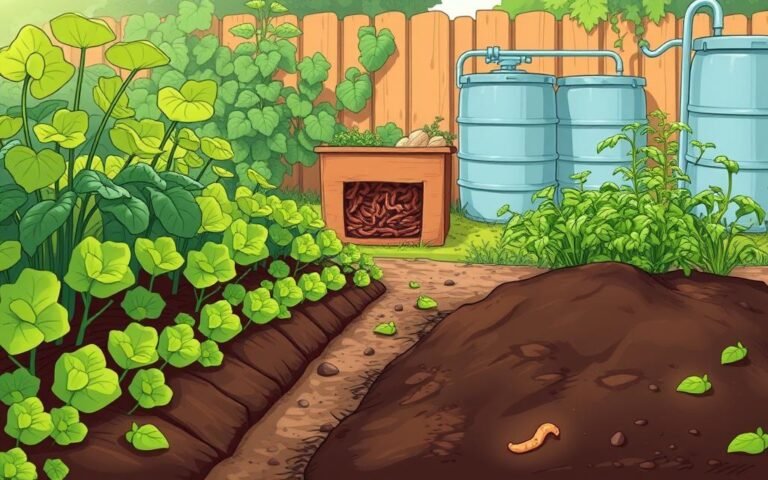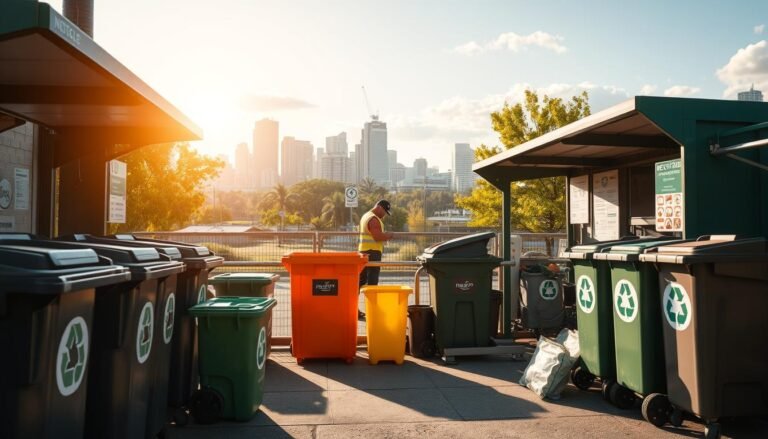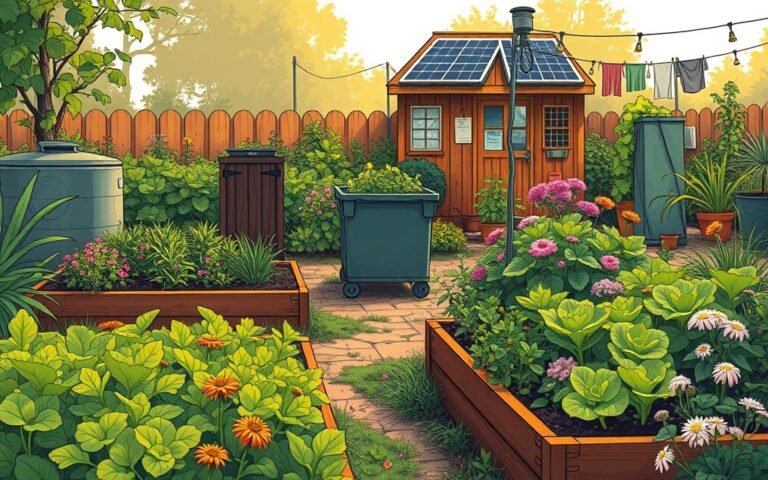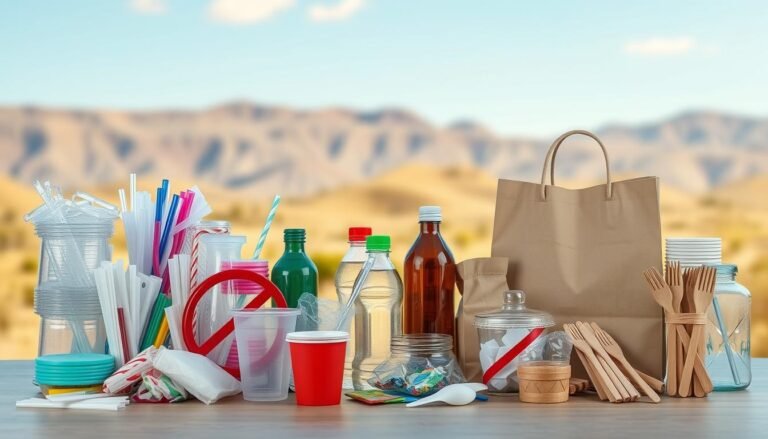Embracing a sustainable living approach is crucial for reducing our daily environmental footprint. In Australia, adopting a zero waste lifestyle can significantly contribute to a healthier planet.
By making simple changes to our daily habits, we can make a significant impact. This article will explore practical zero waste tips to help Australians live more sustainably.
Key Takeaways
- Simple swaps to reduce daily waste
- Efficient ways to reduce household waste
- Sustainable living tips for Australians
- Easy ways to adopt a zero waste lifestyle
- Benefits of reducing environmental impact
Understanding the Zero Waste Movement in Australia
The zero waste lifestyle is becoming increasingly popular in Australia, driven by growing environmental concerns. As Australians become more aware of the impact of their daily choices on the environment, many are adopting sustainable living practices to reduce their ecological footprint.
The Growing Popularity of Waste Reduction in Australia
Waste reduction has become a significant focus in Australia, with communities and individuals actively seeking ways to minimize waste. This movement is driven by the desire to protect Australia’s unique and fragile environment.
Key Australian Zero Waste Influencers and Organisations
Influencers and organizations are playing a crucial role in promoting zero waste lifestyles across Australia. Groups such as the Australian Zero Waste Alliance are at the forefront, providing resources and support to individuals and communities.
Environmental Challenges Unique to Australia
Australia faces distinct environmental challenges, including the protection of its unique wildlife and conservation of water resources. The country’s vast deserts and sensitive ecosystems make waste management particularly critical.
How Australia’s Waste Crisis Differs from Global Patterns
Australia’s waste crisis has its own characteristics, different from global patterns. The country’s isolation and unique biodiversity mean that waste management strategies must be tailored to its specific needs.
Understanding these differences is crucial for developing effective waste reduction strategies that address Australia’s particular environmental challenges.
The Zero Waste Lifestyle Australia: Getting Started
Embarking on a zero waste lifestyle in Australia requires a thoughtful approach to understanding and managing your daily waste. This journey is not just about reducing landfill waste but also about adopting sustainable practices that contribute to a healthier environment.
Assessing Your Current Waste Output
The first step towards a zero waste lifestyle is to assess your current waste output. This involves monitoring the types and amounts of waste your household generates. By doing so, you can identify areas where you can make significant reductions.
Setting Realistic Goals for Waste Reduction
Once you have a clear understanding of your waste output, set realistic goals for waste reduction. This could involve reducing your use of single-use plastics, increasing your recycling, or composting food waste. Setting achievable goals will help you stay on track.
Essential Tools for Your Zero Waste Journey
To successfully transition to a zero waste lifestyle, you’ll need some essential tools. These include reusable bags, containers, water bottles, and coffee cups. Investing in these items will significantly reduce your reliance on disposable products.
Where to Find Zero Waste Supplies in Australian Cities and Regional Areas
Finding zero waste supplies in Australia is easier than ever, with many eco-friendly stores and online retailers offering a wide range of products. In cities, you can visit specialty zero waste stores, while in regional areas, online shopping provides a convenient solution. Look for products made from sustainable materials and designed for reuse.
Kitchen Waste Reduction Strategies
Reducing kitchen waste is a crucial step towards adopting a zero waste lifestyle in Australia. By making simple changes to our daily habits, we can significantly minimize our environmental impact. This section will explore effective strategies for reducing kitchen waste.
Plastic-Free Food Shopping in Australian Supermarkets
One of the most impactful changes Australians can make is switching to plastic-free food shopping. Major supermarkets like Woolworths, Coles, and IGA are gradually incorporating zero waste options.
Navigating Woolworths, Coles, and IGA with Zero Waste Principles
To shop zero waste in major supermarkets:
- Bring reusable bags and containers.
- Choose products with minimal or biodegradable packaging.
- Buy in bulk where possible.
Bulk Food Stores Across Australian Cities
Bulk food stores are becoming increasingly popular across Australian cities, offering a range of products from grains to cleaning supplies without the packaging.
| City | Popular Bulk Stores |
|---|---|
| Sydney | The Source Bulk Foods, Bulk Barn |
| Melbourne | Bulk Nutrients, Eco Friendly Bulk |
Composting Options for Urban and Rural Australians
Composting is an effective way to reduce kitchen waste. Both urban and rural Australians can benefit from composting, whether through backyard composting or utilizing council programs.
FOGO Bins and Council Composting Programs
Many Australian councils offer FOGO (Food Organics and Garden Organics) bins, which are specifically designed for composting food waste. Check with your local council to see what programs are available.
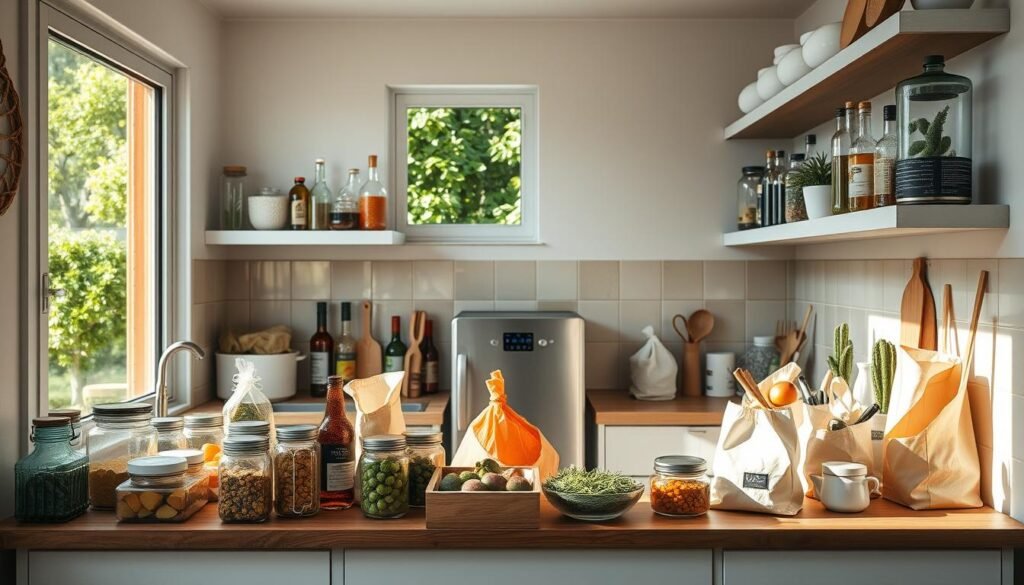
By implementing these kitchen waste reduction strategies, Australians can make a significant impact on reducing their environmental footprint. Every small change counts, and collective action can lead to substantial positive change.
Bathroom and Personal Care Zero Waste Swaps
Making the switch to zero-waste bathroom and personal care products is a significant step towards sustainable living in Australia. By choosing products with minimal or biodegradable packaging, Australians can significantly reduce their environmental footprint.
Australian-Made Plastic-Free Toiletries
Several Australian brands are now offering plastic-free toiletries. For instance, Koala Klean provides a range of bamboo toothbrushes and refillable toothpaste tablets. Another brand, Faith in Nature, offers shampoo and conditioner bars that are free from plastic packaging.
DIY Personal Care Products Using Local Ingredients
Creating your own personal care products using local ingredients is not only cost-effective but also ensures that your products are free from harsh chemicals. For example, you can make a nourishing face mask using honey and avocado, both readily available in Australia.
Sustainable Menstrual Products Available in Australia
Menstrual products are a significant contributor to waste. Sustainable alternatives include menstrual cups and reusable cloth pads. Brands like Moody Moon and Clothsanity offer a range of stylish and comfortable options.
| Product | Traditional Option | Zero-Waste Alternative |
|---|---|---|
| Toothbrush | Plastic toothbrush | Bamboo toothbrush |
| Shampoo | Bottled shampoo | Shampoo bars |
| Menstrual Products | Disposable pads/tampons | Menstrual cups/reusable cloth pads |
By incorporating these zero-waste swaps into your daily routine, you can make a significant impact on reducing waste and promoting sustainable living in Australia.
Reducing Waste in Your Wardrobe
Reducing waste in our wardrobes is a crucial step towards achieving a zero-waste lifestyle in Australia. The fashion industry is a significant contributor to waste and pollution, but by making a few simple changes, Australians can reduce their environmental impact.
Sustainable Fashion Brands in Australia
Australia is home to many sustainable fashion brands that are making a positive impact. Brands like Alannah Hill and Spell Designs are committed to using eco-friendly materials and practices.
- Alannah Hill: Known for their luxurious fabrics and timeless designs.
- Spell Designs: Uses environmentally friendly materials and practices.
Second-Hand Shopping: Op Shops and Online Marketplaces
Second-hand shopping is a great way to reduce waste in your wardrobe. Australia has a thriving op shop culture, with popular stores like Vinnies and Salvation Army. Online marketplaces like Facebook Marketplace and Gumtree are also great resources.
From Vinnies to Facebook Marketplace: Australia’s Best Second-Hand Options
| Platform | Type | Benefits |
|---|---|---|
| Vinnies | Op Shop | Charitable, affordable, and varied selection. |
| Facebook Marketplace | Online Marketplace | Convenient, wide range of items, and local transactions. |
| Gumtree | Online Marketplace | Varied listings, including second-hand clothing. |
Clothing Repair and Upcycling Tips
Extending the life of your clothing is crucial for reducing waste. Simple repairs like fixing buttons or hemming pants can make a big difference. Upcycling old clothes into new items, like turning old t-shirts into bags, is also a creative way to reduce waste.
Zero Waste Home Cleaning and Maintenance
Maintaining a zero waste home in Australia requires a holistic approach, starting with cleaning and maintenance habits. By adopting sustainable practices, Australians can significantly reduce their environmental footprint.
Natural Cleaning Solutions Using Australian Ingredients
Switching to natural cleaning solutions is a simple yet effective way to reduce waste. Many Australian households are now using ingredients like lemon, vinegar, and baking soda to create effective cleaning products. These ingredients are not only environmentally friendly but also cost-effective and readily available.
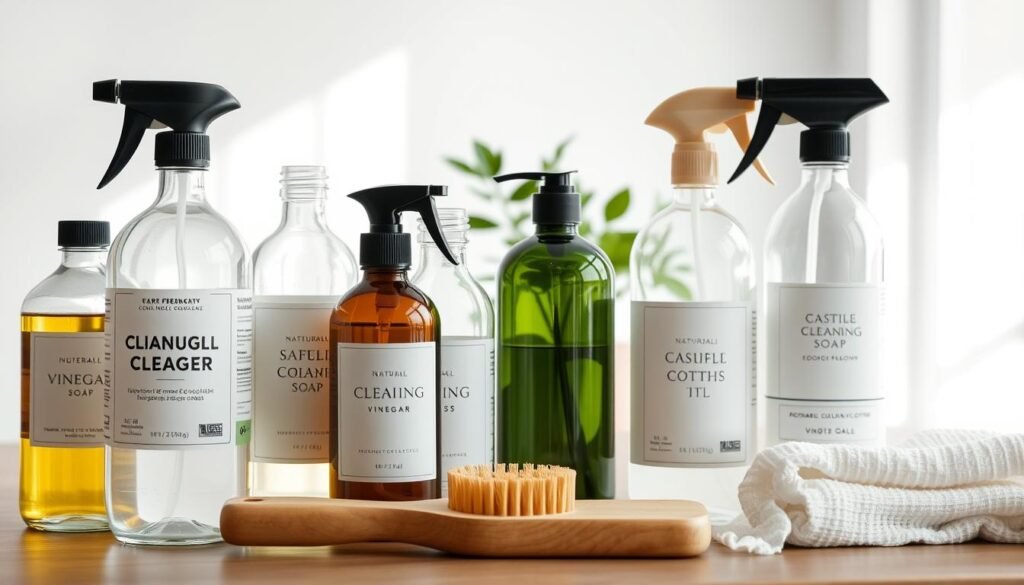
Reusable Cleaning Tools and Where to Find Them
Investing in reusable cleaning tools is another step towards a zero waste home. Microfiber cloths, for instance, can replace paper towels, reducing paper waste. Australians can find these products at local hardware stores or online marketplaces that specialize in eco-friendly products.
Reducing Electronic and Household Waste
Reducing electronic and household waste involves being mindful of consumption and disposal practices. Australians are encouraged to repair rather than replace electronic devices and to recycle household waste through appropriate channels.
E-Waste Recycling Programs in Australia
Australia has several e-waste recycling programs that allow citizens to dispose of electronic waste responsibly. Programs like the Australian Government’s Product Stewardship Act provide guidelines and facilities for e-waste recycling, ensuring that hazardous materials are handled properly.
By implementing these strategies, Australians can make a significant impact on reducing waste and promoting sustainable living.
Sustainable Food Practices for Australians
Australians can significantly reduce their environmental footprint by adopting sustainable food practices. One of the key areas to focus on is reducing food waste, which not only saves money but also decreases the amount of waste sent to landfills.
Reducing Food Waste in Your Home
Reducing food waste involves planning your meals, using up leftovers, and composting food scraps. By doing so, you can significantly cut down on the amount of waste you produce. Here are some zero waste tips to get you started:
- Plan your meals for the week to avoid buying too much food.
- Use up leftovers creatively to reduce waste.
- Compost food scraps to create nutrient-rich soil for your garden.
Growing Your Own Food in Australia’s Climate
Growing your own food is another effective way to embrace a zero waste lifestyle Australia. Not only does it provide you with fresh produce, but it also reduces reliance on industrial agriculture and transportation. To succeed, consider the following:
- Choose crops that are suitable for Australia’s climate and your local region.
- Use sustainable gardening practices, such as drip irrigation and mulching.
Adapting to Drought Conditions and Water Restrictions
In times of drought, it’s crucial to adapt your gardening practices to conserve water. This can include using drought-resistant plants, implementing rainwater harvesting, and being mindful of water restrictions.
Supporting Local Farmers and Producers
Supporting local farmers and producers is a vital aspect of sustainable food practices. By doing so, you are promoting local economies and reducing carbon emissions associated with transporting food over long distances.
Farmers’ Markets and Community Supported Agriculture
Visiting farmers’ markets and participating in community-supported agriculture (CSA) programs are excellent ways to support local food systems. These initiatives allow you to purchase fresh, locally grown produce while directly supporting local farmers.
Zero Waste On-the-Go: Work, School and Travel
Maintaining a zero waste lifestyle while traveling, working, or studying in Australia can be challenging but rewarding. As more Australians adopt sustainable living practices, the need for effective on-the-go waste reduction strategies has become increasingly important.
Creating Your Australian Zero Waste Kit
Assembling a zero waste kit is a practical first step. Include essentials like reusable bags, a stainless steel water bottle, and a bamboo utensil set. For those who travel frequently, consider packing plastic-free travel toiletries to minimize waste.
Navigating Takeaway Food and Coffee Culture
Australia’s café culture is renowned, but it can be challenging to avoid single-use containers. Many Australian cafés and restaurants now support BYO container policies, making it easier to enjoy takeaway while minimizing waste.
BYO Container Policies at Australian Cafés and Restaurants
Some businesses offer discounts for customers who bring their own containers, promoting a zero waste lifestyle. Here are a few practices to adopt:
- Carry a reusable coffee cup and utensils.
- Choose eateries that support BYO containers.
- Refuse single-use plastics and straws.
Zero Waste Travel Tips for Exploring Australia
When traveling across Australia, adopt zero waste practices by planning ahead. Pack reusable items, choose eco-friendly accommodations, and research local waste reduction initiatives. This not only reduces your environmental footprint but also enhances your travel experience.
By incorporating these strategies into your daily routine and travels, you contribute to a more sustainable living environment in Australia. Every small change counts towards a larger positive impact on our planet.
Managing Waste During Australian Holidays and Events
As Australians celebrate various holidays and events throughout the year, adopting zero-waste practices can significantly reduce environmental impact. The festive season, in particular, is a time when waste generation peaks due to increased consumption and disposal of goods.
Sustainable Gift-Giving Ideas
One of the significant contributors to waste during holidays is gift wrapping and the gifts themselves. Consider these sustainable gift-giving ideas:
- Opt for experiences, like tickets to events or classes, instead of physical gifts.
- Choose gifts made from sustainable materials or produced locally.
- Use reusable wrapping materials, such as cloth or recycled paper.
Reducing Waste During Christmas and Other Celebrations
Christmas and other celebrations can generate a lot of waste. Here are some tips to reduce waste:
- Plan your shopping list to avoid impulse buys and reduce packaging waste.
- Use digital invitations and cards instead of paper ones.
- Repurpose decorations from previous years.
Eco-Friendly Alternatives to Traditional Christmas Crackers and Decorations
Consider eco-friendly alternatives for traditional Christmas elements:
- Make your own crackers using recycled materials.
- Use natural elements like pinecones, leaves, and branches for decorations.
- Opt for LED lights or solar-powered decorations.
Eco-Friendly Party Planning
When planning parties for holidays or events, incorporate eco-friendly practices:
- Use compostable or reusable tableware.
- Serve locally sourced and seasonal food.
- Encourage guests to bring their reusable containers or bags.
By implementing these zero waste tips during Australian holidays and events, individuals can significantly reduce their environmental footprint and contribute to a more sustainable future.
Community Engagement and Advocacy
Embracing a zero-waste lifestyle in Australia extends beyond personal choices, requiring a collective effort through community engagement and advocacy. As the zero-waste movement grows, so does the importance of community involvement in driving change.
Zero Waste Community Groups Across Australia
Various community groups across Australia are dedicated to promoting sustainable living AU practices. These groups often organize workshops, clean-up events, and educational programs to foster a community-wide commitment to reducing waste. For instance, local groups might focus on initiatives for beginners in adopting a zero-waste lifestyle.
Advocating for Waste Reduction in Your Local Council
Advocacy plays a crucial role in pushing for policy changes at the local level. By engaging with your local council, you can support initiatives that promote waste reduction and sustainability. This might involve participating in council meetings, signing petitions, or joining local advocacy groups focused on zero waste lifestyle australia.
Supporting Australian Environmental Initiatives
Australia has numerous environmental initiatives aimed at reducing waste and promoting sustainability. Supporting these initiatives, either through volunteering or donations, can significantly impact the country’s environmental footprint. One notable initiative is the container deposit schemes implemented in various states.
Container Deposit Schemes and Other State-Based Programs
Container deposit schemes encourage individuals to return recyclable containers for a refund, significantly reducing litter and increasing recycling rates. For more information on how these schemes and other state-based programs are making a difference, you can refer to studies on their effectiveness, such as those found on scientific databases.
Overcoming Challenges in Your Zero Waste Journey
The path to a zero waste lifestyle is not without its challenges, but understanding these hurdles is the first step to overcoming them. As Australians embrace sustainable living, they may encounter various obstacles that can be navigated with the right strategies and support.
Dealing with Resistance from Family and Friends
One of the common challenges is resistance from family and friends who may not understand or support your zero waste decisions. Effective communication is key; sharing your reasons and the benefits of a zero waste lifestyle can help others understand your perspective. You can also invite them to join you in your journey, making it a fun, shared experience.
Managing Zero Waste Living on a Budget
Living zero waste doesn’t have to be expensive. In fact, many zero waste practices, such as reducing consumption and repurposing items, can save money. Smart shopping and planning are essential to managing your zero waste lifestyle on a budget. Consider buying in bulk, shopping second-hand, and making your own cleaning products.
Adapting to Regional Limitations in Australia
Australia’s diverse regions present unique challenges for zero waste living. Urban areas may have more access to bulk stores and recycling facilities, while rural areas might need to get creative with repurposing and composting.
Rural and Remote Area Solutions
For those in rural and remote areas, solutions include using local resources, such as repurposing old items and making your own products. Communities can also come together to share resources and knowledge, making zero waste living more accessible and effective.
Conclusion: Your Impact on Australia’s Sustainable Future
Adopting a zero waste lifestyle in Australia is a significant step towards a more sustainable future. By implementing the tips and strategies outlined in this article, individuals can make a substantial impact on reducing their daily environmental footprint.
Embracing a zero waste lifestyle is not just about personal change; it’s about being part of a broader movement towards sustainable living AU. Every small action counts, from reducing plastic use to supporting local farmers and producers.
By making conscious choices in our daily lives, we can collectively drive positive change. The zero waste tips provided throughout this article are designed to be practical and achievable, making it easier for Australians to live more sustainably.
As more individuals adopt these practices, the cumulative effect can lead to significant environmental benefits. It’s a journey that requires commitment, but the rewards are well worth the effort. By choosing a zero waste lifestyle, Australians can contribute to a cleaner, greener, and more sustainable future for generations to come.
